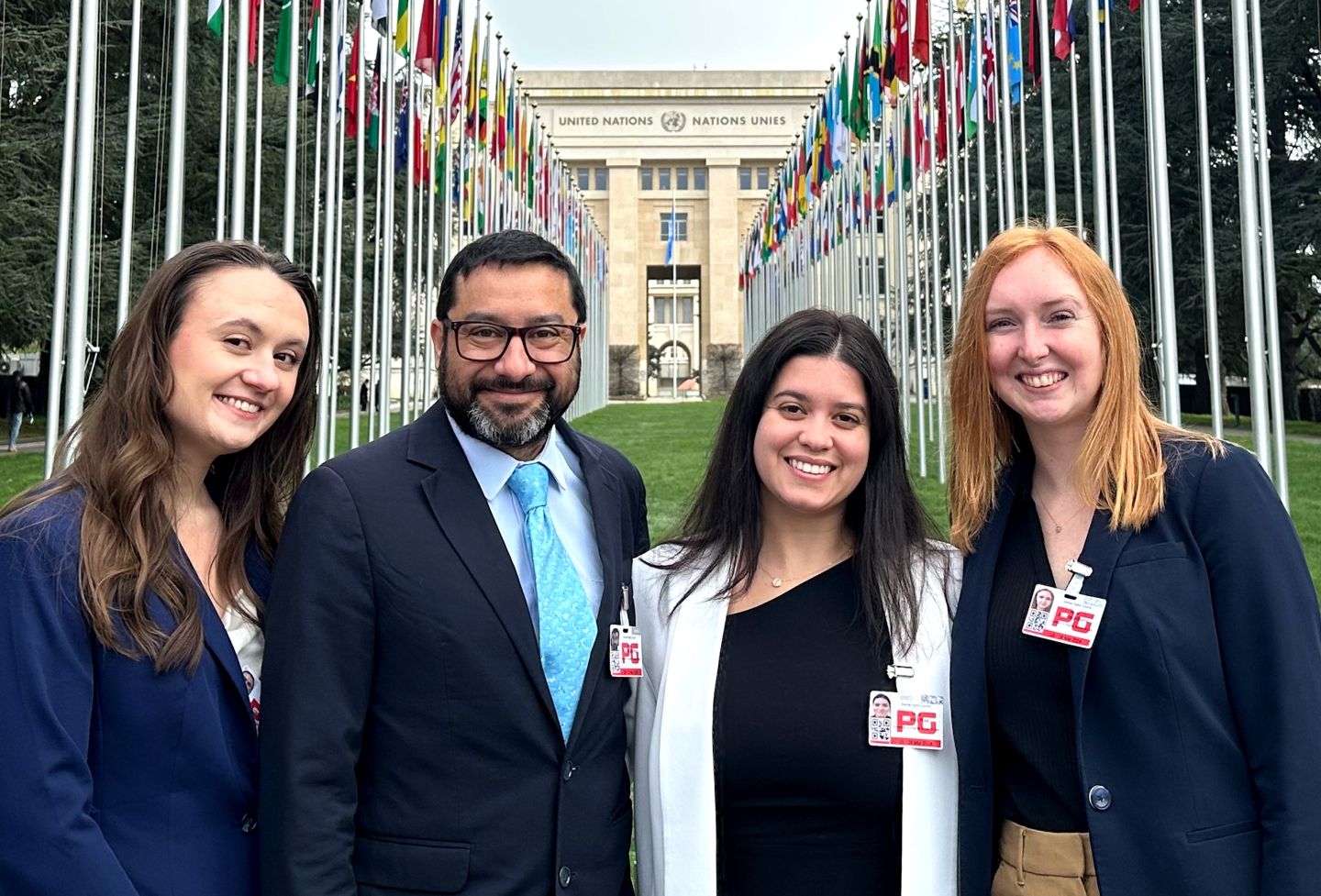Lawsuit Will Eventually Topple Rule Barring Women from Ground Combat, Draft, Coughlin Says

Like once-entrenched sexual and racial discrimination in the workplace, the restriction barring women from ground combat in the U.S. military is bound to fall, Professor Anne Coughlin predicted while talking to an undergraduate women's studies class in Ruffner Hall Oct. 14.
Coughlin said winning women's right to all jobs in the military and requiring them to register for the draft alongside men would be a final blow to formal sex discrimination that a history of litigation spearheaded by now-Supreme Court Justice Ruth Bader Ginsburg has all but defeated. Ginsburg, who graduated at the top of her Harvard Law class, could only find a job as a legal secretary after graduating, Coughlin said. Ginsburg eventually won a series of court victories that added up to enormous gains for working women. Coughlin called the 1996 Supreme Court decision that required admitting qualified women into the publicly funded Virginia Military Institute a "culmination" of Ginsburg's work.
This last remnant of what Coughlin called "government-enforced" discrimination could affect many women's careers negatively. She described how the introductions of speakers at Law School events, in which the speaker's credentials are touted, made her think about how Americans view men who have participated in ground combat.
"At the moment that credential is read, a hush comes over the room," she said. "It's clear that men's resumes are different from women's resumes."
Coughlin called military combat service both an "obligation of citizenship" and an "opportunity." Having served in war is an important credential for many leadership positions. War councils are mostly, if not entirely, composed of men. Coughlin said her research assistant has helped her calculate that women's voices have nearly vanished from the Bush administration and expert commentary as war with Iraq appears imminent.
"It is a prerequisite to obtaining the highest military ranking that you participate in armed combat," she said, noting that 20 percent of all military positions are ground combat jobs. "There's a glass ceiling." With the importance placed on military service, "this is a very significant obstacle to personal achievement."
Coughlin said the draft, which requires men over 18 to register or face a felony charge, is directly tied to the ground combat issue since anyone drafted would likely go into a combat situation. If a woman attempted to register, her form would either be ignored or mailed back to her.
"Can you imagine such a discrimination based on race?" Coughlin asked. "This is absolutely unheard of."
Coughlin discussed how possible arguments in favor of keeping women out of ground combat might play out in a lawsuit. Part of her research included the findings a Clinton administration presidential commission made in the 1990s that recommended continued exclusion.
The first argument the government might use is that "women lack the aerobic capacity and the muscle capacity," a view that Coughlin believes would not stand up alone in court. Ground combat work "involves a lot of digging", military experts claim, and a soldier might have to carry a comrade off the field in battle. But in previous cases involving women firefighters or policeman, the Supreme Court has maintained that employers have to test employees individually based on a set of neutral criteria. Coughlin maintained that the physical requirements are difficult for most men to satisfy, but do not bar them from service. Considering women's gains in sports and an increased focus on women's fitness in recent years, Coughlin said that some women have proven they have the physical abilities required.
Another tack the government could take involves unit cohesion and general objections about what the presence of women would do to a unit facing combat. Coughlin said many assume male soldiers won't be able to bond in the same way or depend on each other fully with women around. She said military leaders will pull you aside and tell you, "you don't know these guys, they're knuckleheads." Coughlin said inevitably this argument stereotypes men as sex-crazed or easily distracted from duty and hierarchy.
Others point out that integrating women would be costly because of the need for separate bathroom facilities.
If male and female soldiers dress and bathe in the same facilities, "what do they think is going to happen? They think people are going to start having sex," Coughlin said, thus destroying unit cohesion.
The scenario this paints — units breaking down over jealousies and sex — seems not only soap operatic, Coughlin said, but studies show that the last thing on people's minds in combat situations is having sex. Naysayers may also worry that women will be sent home pregnant, creating higher "casualties." The solution to that, Coughlin said, is to "make it a crime" and the punishment, job loss. Adultery and fraternization are already prosecuted as military crimes. In a similar vein, Coughlin said, many male soldiers were sent home during Desert Storm because of injuries obtained while playing sports, so casualties off the battlefield are not unheard of today.
Some opponents believe the spectacle of how a woman POW is treated may destabilize not only the unit she came from, but the country itself. Coughlin noted that the few female soldiers that have been captured have indeed been raped, but said male POWs are also often raped or sexually tortured.
Many think "men just can't fight if they're out there in units that include women," she said. They "won't fight for the same vision of home."
Coughlin said these arguments are the same as those made in the past about other physically demanding jobs women tackle today, and the psychological arguments resemble those made while trying to keep African-Americans out of the military.
"Most arguments are focused on the psychology of men that are there," Coughlin said, and there is "no discussion of an all-female fighting unit."
She questioned why Americans base a person's standing on such masculine attitudes and achievements. Women's jobs at the same time during war — perhaps staying home and caring for children — aren't deemed "resume-worthy."
"How are you going to change that? Until women are able to break through in the councils of power, the resumes are going to continue to look male-oriented," she said. "I want one of you to sue. That's what I want."
Founded in 1819, the University of Virginia School of Law is the second-oldest continuously operating law school in the nation. Consistently ranked among the top law schools, Virginia is a world-renowned training ground for distinguished lawyers and public servants, instilling in them a commitment to leadership, integrity and community service.


